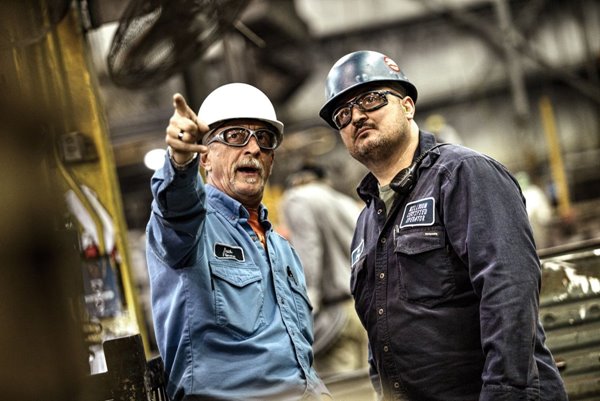Strengthening Workers for the Daily Grind
Grinding castings is a strenuous and demanding job – and assigning workers to that necessary task is a real challenge for metalcasting operations. But it’s essential work, and as foundries produce higher volumes of castings the strain and need grow proportionally. Waupaca Foundry is pioneering use of “adaptive technology” to support workers assigned to manually grind iron castings.
“Adaptive” is the term of art that developers have adopted to describe how established tools are made more functional or effective by applying newer technologies. The Ironhand® glove that Waupaca Foundry workers are using now is described as “the world’s first” soft exoskeleton designed for human hands – to improve gripping strength and reduce the strain required of the machinist. The exoskeleton was tested first at Waupaca Foundry’s finishing operation in Etowah, TN, and as of Q4 2022 it was being run in trials at the Waupaca foundry in Marinette, WI.
Waupaca Foundry, which is a Hitachi Metals Ltd. holding, produces gray, ductile, compacted graphite, and austempered ductile iron castings for manufacturers in the automotive, commercial vehicle, agriculture and construction equipment, and other industrial markets.
The Ironhand system consists of a glove that covers all of a machinist’s fingers, and a power pack that he or she wears as a backpack or holstered to the hip. The system is activated when the operator starts moving his/her hand to perform a task, relying on sensors located on the palm and on the fingers.
The system draws information from each operators’ use to customize its work. This "Smart Assist" function means that Ironhand learns how each operator uses the glove and adapts its control functions to provide a natural force. The entire system weighs only 6 pounds and it is integrated with existing personal protective equipment (PPE) provided to the grinding room workers.
Currently, 30 of the Ironhand systems are in use at two Waupaca Foundry operations and team members have reported it supports their bodies, is comfortable to wear and use, and is easy to operate.
The most common use of the Ironhand glove is for manual grinding, but it’s also used for press functions in which the workers lift castings and perform other repetitive tasks.
As of late 2023, Waupaca Foundry indicated plans to expand the use of Ironhand to other foundry functions – namely in the molding and core room operations. Following a 6-month trial and adjustment period, the Ironhand system was due to be implemented at all Waupaca Foundry locations.
“For the last 25 years, we have improved technology with the goal of eliminating manual casting processing, but we cannot eliminate handling iron castings as part of our daily jobs,” stated Waupaca Foundry director of health and safety Jon Loken. “This technology bridges the gap between manual processing and total automation.”
“The Ironhand works well for holding onto air tools for an extended period of time,” according to a grinding room operator at Waupaca, Andrew Lang.
Another mill room grinder, Trever Godfrey added: “I had to see what it was all about, so I said I wanted to try it... It makes a big difference because the glove takes over and does most of the work for you. It also took quite a bit of the vibration out of my arm.”
Loken called the workers response to the new technology “outstanding.”
“It’s better than imagined and this is one more step in our goal to improve ergonomics and the overall work environment for our team,” he said.
Ironhand was developed by a Swedish company, Bioservo Technologies – which developed the SEM (soft extra muscle) process that draws power from batteries to multiply grip force. The glove’s sensors, actuators, and tendons compare to human nerves, muscles, and tendons, so the glove increases the wearer’s power and reduces his/her fatigue, such as the fatigue that sets in soon after a worker begins to continuously grip a tool.
The technology has been applied in different manufacturing sectors, but the foundry setting introduced specific challenges – such iron dust in the mill room that penetrated the gloves and connectors. In response, Bioservo enhanced the insulation on the Ironhand’s cables. The developer is continuing to improve the system based on discoveries during the product testing phase.
“The application with Waupaca Foundry opens new possibilities for Ironhand to truly make a difference for people in their daily work life within a large and demanding industry. The initial results show that a majority of workers who tested Ironhand want to use it in their daily work to stay healthy,” stated Petter Bäckgren, Bioservo CEO.
The developer, its distributor, Rhino Tool House, and Waupaca Foundry aimed to arrive at a design for a long-lasting glove that may be used in both foundry work and machining operations.
“This is a product we are very excited about and we have deployed this in various production environments around the country,” explained Chip Paulsen, president of distribution for Rhino Tool House, which is supporting installations at multiple Waupaca locations and working with Bioservo to monitor the results. “Everything from automotive factories, aerospace plants, warehousing, fabrication shops and now foundries are using the technology.”

